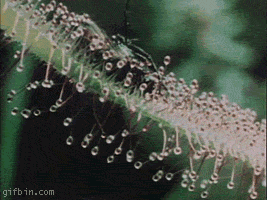
We have been told, over and over, if we want to save the planet, we have to stop murdering and eating our kill. (maybe someone should explain this to the plant, eating the fly in the video above).
We told you about the Swiss government and their ethics panel weighing in on the "dignity" of plants and said that the arbitrary killing of flora is morally wrong.
The concept of what could be called "plant rights" is being seriously debated.
A "clear majority" of the panel adopted what it called a "biocentric" moral view, meaning that "living organisms should be considered morally for their own sake because they are alive." Thus, the panel determined that we cannot claim "absolute ownership" over plants and, moreover, that "individual plants have an inherent worth." This means that "we may not use them just as we please..."
We also discussed findings that suggest plants and vegetables when under threat, communicate the approaching danger to other plants nearby; and also call in help from other creatures.
Biologists at the University of Turin and the Max Planck Institute in Jena reported to have found evidence that plants sensed — and reacted to — the presence of hungry, leaf-chomping enemies.
Their response was to release an odor, similar to lavender, warning other plants to the presence of enemies
Wasps, the natural enemies of many predators, were drawn by the odor to the plant, killing the intruder or injected it with eggs that later killed it.
Then we learned about garden vegetables such as tomatoes and potatoes, and how they have been found to be deadly killers on a par with Venus fly traps, along with 50% of other Garden Vegetables,Biologists at the University of Turin and the Max Planck Institute in Jena reported to have found evidence that plants sensed — and reacted to — the presence of hungry, leaf-chomping enemies.
Their response was to release an odor, similar to lavender, warning other plants to the presence of enemies
Wasps, the natural enemies of many predators, were drawn by the odor to the plant, killing the intruder or injected it with eggs that later killed it.
according to research.
The research shows that they capture and kill small insects with their sticky little hairs on their stems and then absorb nutrients through their roots when the animals decay and fall to the ground.
At first it was thought that the murderous act was developed where the soil was poor quality, but even the home grown garden varieties have this ability, and they use it.
The researchers, publishing their finding in the ‘Botanical Journal of the Linnean Society’, said: “We may be surrounded by many more murderous plants than we think.
“We are accustomed to think of plants as being immobile and harmless, and there is something deeply unnerving about the thought of carnivorous plants," they added.
(watch the below video)
Many claim the moral high ground about eating, ignoring, the fact, we all kill to live.
When it comes to eating, death is a part of life.
Plant life kills, animals kill, insects kill, people kill, it's what we do to to stay alive, but let's not pretend to be superior just because we choose to kill something over another.
We respect animals and vegetables because they sustain our lives.
What we eat we do so with a sense of respect, for it is providing us sustenance.
Human beings kill for food, so do all inhabitants of nature, it's the food chain, and it teaches us there is no exception .
For those misguided individuals who believe you are contributing to a better world for animals by not eating meat, simply do not understand the basics of nature.
This means we eat our food with a sense of respect because it has an impact upon this world.
We agree, we should value our food for what it offers us.
It is the lack of respect for what sustains us that is wrong.
It is wrong to keep the food we eat them locked up in cages, pumping them full of hormones to simply make money.
But this doesn't make eating meat wrong.
It makes the process wrong.
Is there a moral justification for the killing other animals for food? - Yes. It's natural behavior. Animals kill other animals without concern for the rights of the animals they are killing for food.
We could argue the point, whether this is ethical or not, but remember, nature will continue to be the way it is, it doesn't care.
We will continue with our ethical position, and we don't really care what yours is, unless it interferes with ours.